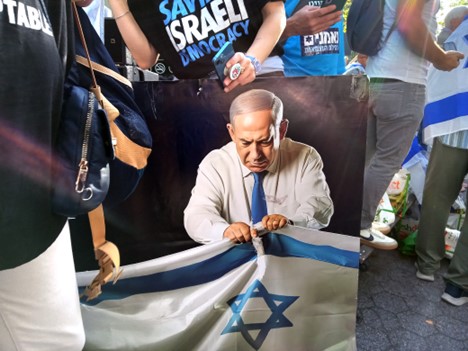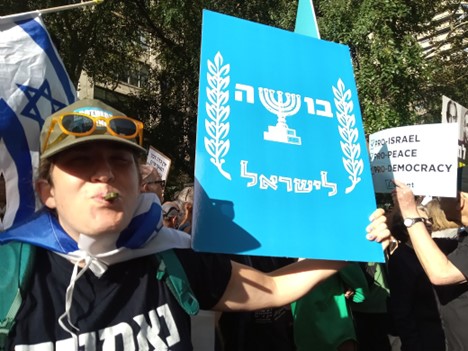
There’s an old Jewish joke: ask ten Jews the best way to screw in a lightbulb, and you’ll get eleven different answers. It’s the same with demonstrations: go to a rally for any collective movement (fill in the blank—climate, women, racial justice) and you’ll find innumerable points of view. At the Climate March in New York City on September 17, 2023, 75,000 people gathered to pressure President Biden on climate change. Along with this shared agenda, marchers also expressed their personal concerns: scientists fearing loss of biodiversity; hip hop artists rallying for racial justice; labor unions lobbying for good-paying jobs in a new green economy.
Five days later, thousands of Israelis and Americans gathered at the UN to protest Netanyahu’s repressive administration in Israel, which has proposed legislation preventing the high court from curtailing the government’s ability to pass unreasonable laws. Many view Netanyahu as an existential threat to Israeli democracy and Netanyahu as a dictator.
Like the Climate March, the march at the UN represented many groups: Rabbis who decry Netanyahu’s compact with far-right religious fanatics; members of the Israeli Army who refuse to serve an anti-democratic government; pro-Palestinian groups that have perpetually fought against dispossession of their land.
The scene was dotted with Israeli flags. Unlike the American left, the Israeli left has retrieved the Israeli flag from the hands of the nationalists and imbued it with new meaning. Other Jewish symbols were reinvented, too. A blue-and-white sign pictured a menorah substituting for the Hebrew letter shin in the word busha—“shame” on Israel.

A woman cranked a noisemaker to obliterate the name of Netanyahu—a strategy used on the holiday of Purim to blot out the name of Haman, who sought to destroy the Jews of Persia—adding to an ear-shattering cacophony of sports whistles, vuvuzelas, plastic Renaissance recorders, catcalls.
According to Daoism, intentionally holding your personal life force in concert with the universal life force amplifies both.
About an hour into the demonstration, someone took the microphone and began singing the Israeli national anthem, whose title, “Hatikvah,” means “Hope.” I haven’t sung “Hatikvah” for years; it had long lost any authenticity.
I didn’t hear it at first, such was the noise from the sport whistles and catcalls. But one by one, these raucous protests quieted, and the sound of “Hatikvah” grew. Unbidden, the words fell from my lips. In this quiet moment of near-universal song (the man in front of me, wearing a pro-Palestinian T-shirt, refused to sing; I stood with him even as I sang), I felt a common prayer for freedom for all.
My eyes filled with tears.